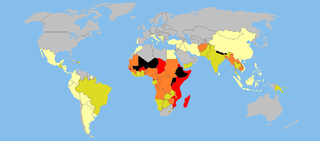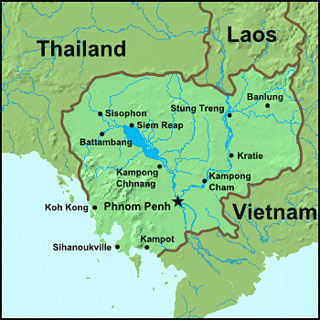
The International Labour Organization (ILO) is a United Nations agency whose mandate is to advance social and economic justice by setting international labour standards. Founded in October 1919 under the League of Nations, it is one of the first and oldest specialised agencies of the UN. The ILO has 187 member states: 186 out of 193 UN member states plus the Cook Islands. It is headquartered in Geneva, Switzerland, with around 40 field offices around the world, and employs some 3,381 staff across 107 nations, of whom 1,698 work in technical cooperation programmes and projects.

Child labour is the exploitation of children through any form of work that deprives them of their childhood, interferes with their ability to attend regular school, or is mentally, physically, socially and morally harmful. Such exploitation is prohibited by legislation worldwide, although these laws do not consider all work by children as child labour; exceptions include work by child artists, family duties, supervised training, and some forms of work undertaken by Amish children, as well as by Indigenous children in the Americas.

Trafficking of children is a form of human trafficking and is defined by the United Nations as the "recruitment, transportation, transfer, harboring, and/or receipt" kidnapping of a child for the purpose of slavery, forced labour, and exploitation. This definition is substantially wider than the same document's definition of "trafficking in persons". Children may also be trafficked for adoption.

Decent work is employment that "respects the fundamental rights of the human person as well as the rights of workers in terms of conditions of work safety and remuneration. ... respect for the physical and mental integrity of the worker in the exercise of his/her employment."
Child labour in Botswana is defined as the exploitation of children through any form of work which is harmful to their physical, mental, social and moral development. Child labour in Botswana is characterised by the type of forced work at an associated age, as a result of reasons such as poverty and household-resource allocations. child labour in Botswana is not of higher percentage according to studies. The United States Department of Labor states that due to the gaps in the national frameworks, scarce economy, and lack of initiatives, “children in Botswana engage in the worst forms of child labour”. The International Labour Organization is a body of the United Nations which engages to develop labour policies and promote social justice issues. The International Labour Organization (ILO) in convention 138 states the minimum required age for employment to act as the method for "effective abolition of child labour" through establishing minimum age requirements and policies for countries when ratified. Botswana ratified the Minimum Age Convention in 1995, establishing a national policy allowing children at least fourteen-years old to work in specified conditions. Botswana further ratified the ILO's Worst Forms of Child Labour Convention, convention 182, in 2000.

Juan Somavía Altamirano is the former Director-General of the International Labour Organization (ILO). He was elected to serve as the ninth Director-General of the ILO by the Governing Body on 23 March 1998. On 7 November 2013, he was appointed by UN Secretary-General Ban Ki-moon to serve as Special Adviser on Interregional Policy Cooperation.

The International Social Security Association (ISSA) is an international organization bringing together national social security administrations and agencies. Founded in 1927, the ISSA has more than 330 member organizations in 158 countries. It has its headquarters in Geneva, Switzerland, in the International Labour Office (ILO).

Child labour in Bangladesh is significant, with 4.7 million children aged 5 to 14 in the work force in 2002-03. Out of the child labourers engaged in the work force, 83% are employed in rural areas and 17% are employed in urban areas. Child labour can be found in agriculture, poultry breeding, fish processing, the garment sector and the leather industry, as well as in shoe production. Children are involved in jute processing, the production of candles, soap and furniture. They work in the salt industry, the production of asbestos, bitumen, tiles and ship breaking.
The International Organisation of Employers (IOE) was created in 1920 to advocate for employers and the business community in the tripartite governance structure of the International Labour Organization (ILO). Today, from its headquarters in Geneva, Switzerland, IOE continues to defend and promote these same interests across a wide range of UN agencies, international organisations, intergovernmental processes and the media. As of September 2019, IOE had 156 national employer organisations members in 145 countries. It remains involved in the activities of the International Labour Organization, acting as Secretariat to the Employers' Group, as well as representing business in international forums, including the G20 intergovernmental process on labour and social policy. It describes itself as "the largest network of the private sector in the world" and "the global voice of business".

Social protection, as defined by the United Nations Research Institute for Social Development, is concerned with preventing, managing, and overcoming situations that adversely affect people's well-being. Social protection consists of policies and programs designed to reduce poverty and vulnerability by promoting efficient labour markets, diminishing people's exposure to risks, and enhancing their capacity to manage economic and social risks, such as unemployment, exclusion, sickness, disability, and old age. It is one of the targets of the United Nations Sustainable Development Goal 10 aimed at promoting greater equality.

A significant proportion of children in India are engaged in child labour. In 2011, the national census of India found that the total number of child labourers, aged [5–14], to be at 10.12 million, out of the total of 259.64 million children in that age group. The child labour problem is not unique to India; worldwide, about 217 million children work, many full-time.
The United Nations Global Initiative to Fight Human Trafficking (UN.GIFT) is a multi-stakeholder initiative providing global access to expertise, knowledge and innovative partnerships to combat human trafficking.
Child labour in Pakistan is the employment of children to work in Pakistan, which causes them mental, physical, moral and social harm. Child labour takes away the education from children. The Human Rights Commission of Pakistan estimated that in the 1990s, 11 million children were working in the country, half of whom were under age ten. In 1996, the median age for a child entering the work force was seven, down from eight in 1994. It was estimated that one quarter of the country's work force was made up of children. Child labor stands out as a significant issue in Pakistan, primarily driven by poverty. The prevalence of poverty in the country has compelled children to engage in labor, as it has become necessary for their families to meet their desired household income level, enabling them to afford basic necessities like butter and bread.

Child labour refers to the full-time employment of children under a minimum legal age. In 2003, an International Labour Organization (ILO) survey reported that one in every ten children in the capital above the age of seven was engaged in child domestic labour. Children who are too young to work in the fields work as scavengers. They spend their days rummaging in dumps looking for items that can be sold for money. Children also often work in the garment and textile industry, in prostitution, and in the military.
The Republic of the Philippines and the United Nations have been affiliated since the conception of the organization. The then Commonwealth of the Philippines was one of the signatories of the 1942 UN Declaration, from which the U.N. Charter of 1945 was based on. The Philippines was also among the 51 original member states, and one of only four Asian nations, that signed this charter, which marked the beginning of the UN operations.
Child labour laws are statutes placing restrictions and regulations on the work of minors.

Armenia was admitted into the United Nations on 2 March 1992, following its independence from the Soviet Union. In December 1992, the UN opened its first office in Yerevan. Since then, Armenia has signed and ratified several international treaties. There are 20 specialized agencies, programs, and funds operating in the country under the supervision of the UN Resident Coordinator. Armenia strengthened its relations with the UN by cooperating with various UN agencies and bodies such as the International Monetary Fund, the World Bank, the World Food Programme, and with the financial institutions of the UN. Armenia is a candidate to preside as a non-permanent member of the UN Security Council in 2031.

The United Nations response to the COVID-19 pandemic has been led by its Secretary-General and can be divided into formal resolutions at the General Assembly and at the Security Council (UNSC), and operations via its specialized agencies and chiefly the World Health Organization in the initial stages, but involving more humanitarian-oriented agencies as the humanitarian impact became clearer, and then economic organizations, like the United Nations Conference on Trade and Development, the International Labour Organization, and the World Bank, as the socioeconomic implications worsened.











